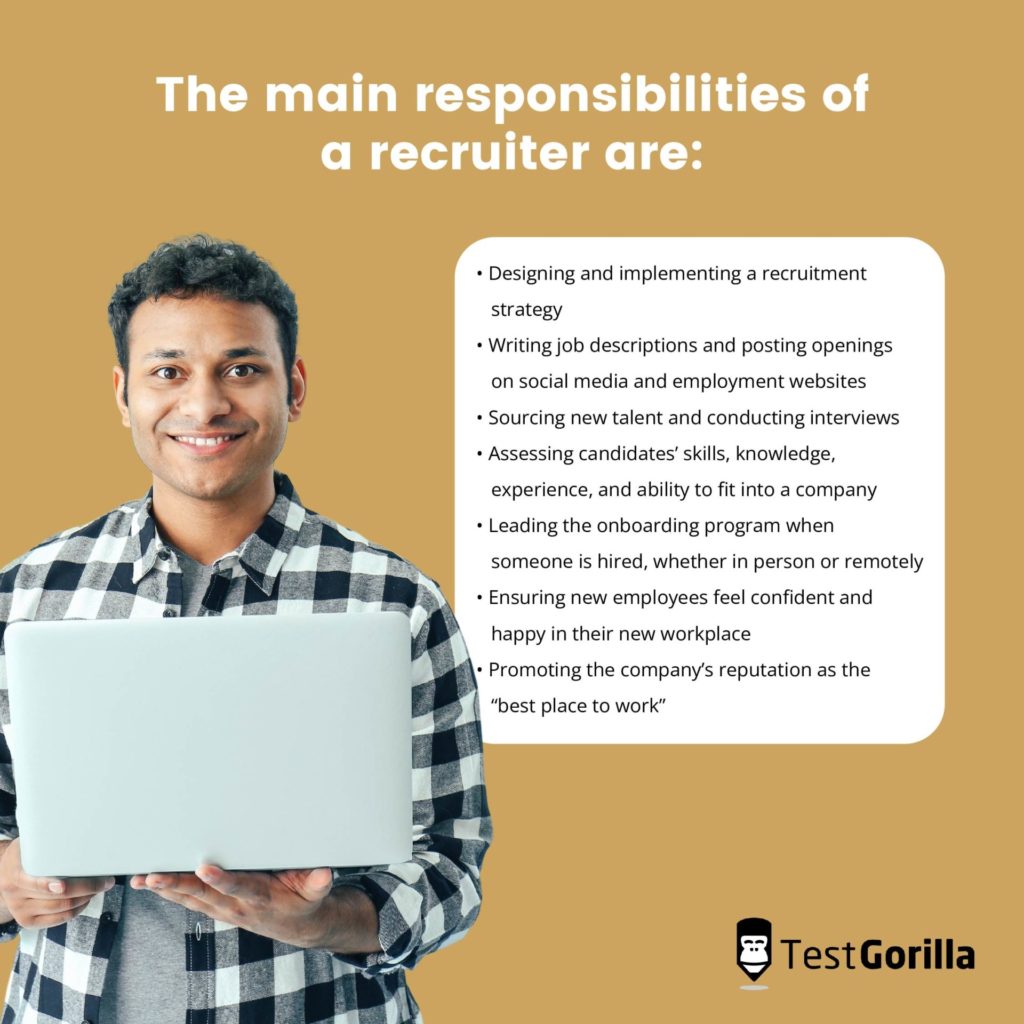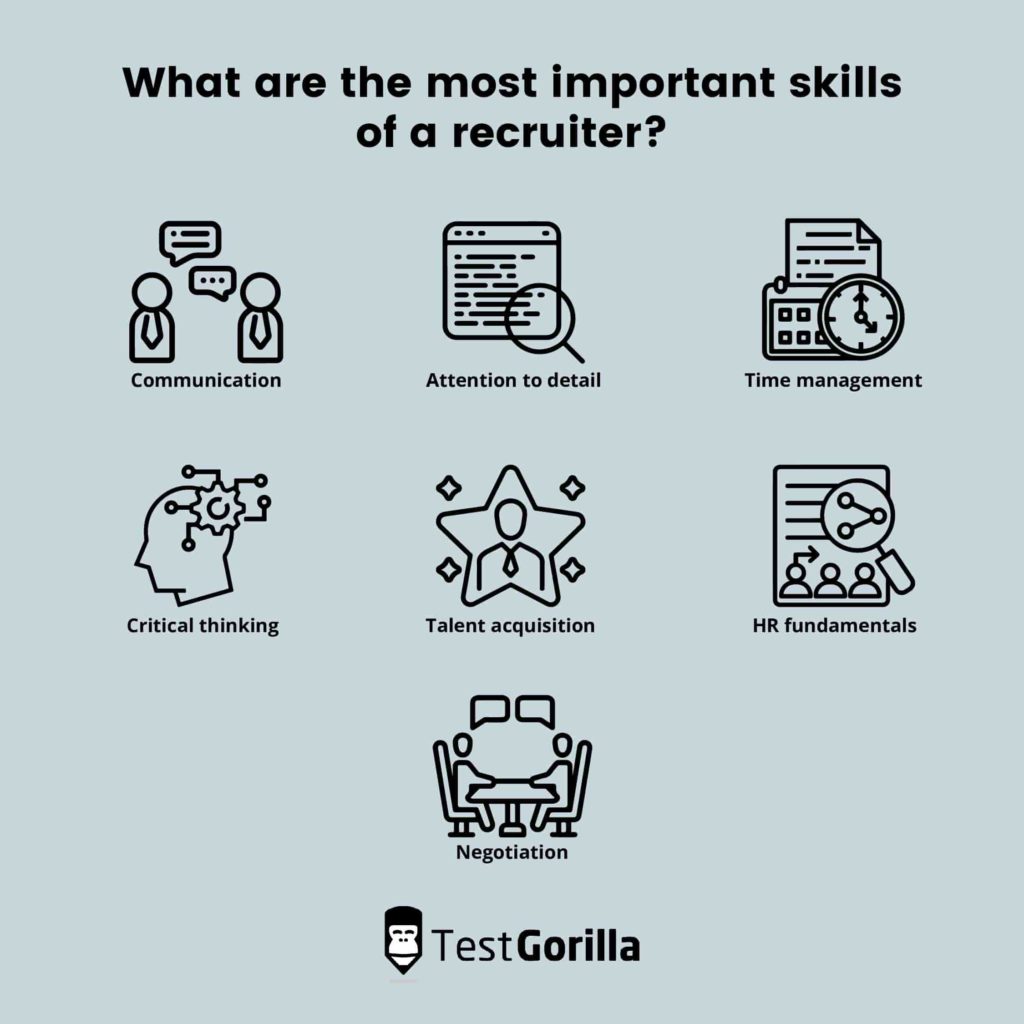Table of contents
Dear recruiters,
TestGorilla wishes you a happy National Recruiter Day!
For the fifth year in a row, companies are celebrating the work and achievements of recruiters on 30 May.
So if you’re a recruiter, congratulations! This is your day.
In this article, we’ll tell you about National Recruiter Day and turn the spotlight on recruiters, exploring:
What is National Recruiter Day?
National Recruiter Day is an unofficial initiative to celebrate the work of all recruiters.
The initiative originated in a 2017 LinkedIn post from Find My Profession’s chief executive, Mike Podesto.
After doing some research, Mike discovered that although we recognize thousands of national days, including National Popcorn Day and National Vodka Day, there was no day celebrating recruiters. Therefore, he dubbed 30 May as “National Recruiter Day.”
The idea: Celebrate the recruiters that landed you that dream job and show them the appreciation they deserve, especially if they made a difference in your work life or provided you with a positive experience while searching for a new job.
Recruiting is not an easy task, and those who do it for a living work hard and should be celebrated – especially since recruiters occasionally get a bad name and the many good ones don’t get the appreciation they deserve.
The recruiting professionals at Find My Profession survey hundreds of LinkedIn users each year to find the best recruiters out there. And the one with the most votes is declared the winner of the “People’s Choice Best Recruiter” awards.
In 2021, not one but three recruiters were named People’s Choice Recruiter of 2021.
What’s the role of a recruiter – and why should we celebrate it?
So what actually is a recruiter?
In essence, a recruiter is a professional responsible for sourcing new talent for companies. Recruiters match candidates with jobs that align with their qualifications and career goals.
The recruiter knows in detail the job description of each position they are trying to fill, and they attempt to match that position with the ideal candidate.
They help job seekers polish their CVs and prepare for interviews, and the most dedicated ones follow up after a candidate is hired to see if things are going well or whether they can help them in any other way.
The main responsibilities of a recruiter are:
Designing and implementing a recruitment strategy
Writing job descriptions and posting openings on social media and employment websites
Sourcing new talent and conducting interviews
Assessing candidates’ skills, knowledge, experience, and ability to fit into a company
Leading the onboarding program when someone is hired, whether in person or remotely
Ensuring new employees feel confident and happy in their new workplace
Promoting the company’s reputation as the “best place to work”
In addition, the recruiter is there to cheer candidates on during the process and provide them with any information and support they need.
After all, finding a new job can be stressful. A good recruiter builds a relationship with the job seeker and becomes akin to a friend at a difficult time.
That is why we need to celebrate all the hard work recruiters do on a daily basis. Without them, finding a job or identifying new hires can become a daunting task for job seekers and companies alike.
What are the most important skills of a recruiter?
Recruiters are not just there to find new talent, even if that takes up most of their time. The best recruiters go above and beyond to ensure their company attracts the most suitable employees and retains them.
Here is a list of the essential skills every top recruiter must possess.
1. Communication
Every recruiter needs to be an excellent communicator since they go through hundreds of applicants every day.
A recruiter will have to reject many job seekers, and the best ones do it gracefully so that the rejection doesn’t dishearten the person on the other side.
Not only that, but they also liaise with all the relevant teams in a firm, the management, and stakeholders.
Therefore, first-rate written and spoken communication skills are the bread and butter of all good recruiters.
2. Attention to detail
Recruiters need to spot the smallest details in people’s profiles and resumes to help someone land their dream job or prevent a company from hiring a bad fit.
Recruiters must also be able to evaluate candidates’ skills precisely and accurately to assess whether they are right for the job. Attention to detail is critical in analyzing employment tests and interview results.
3. Time management
Often, recruiters will juggle posting new job advertisements, scheduling interviews, and attending meetings all in a single day.
At other times, a position may have just been vacated and needs to be filled as soon as possible, and the recruiter needs to source the right talent quickly.
Therefore, good time management and organizational skills are essential for this line of work.
4. Critical thinking
Every good recruiter should be able to read between the lines when it comes to sourcing new talent, and doing so requires strong critical thinking skills.
A poorly written or overly boastful resume doesn’t automatically mean someone will be a good or bad fit for the job. The recruiter’s task is to verify whether a candidate is genuinely up for the job despite what’s on their CV.
5. Talent acquisition
Recruiters must have a good talent acquisition strategy in mind in order to position their company as a top destination for job seekers. And they need to know what to do with that talent once they source, onboard, and train them.
6. HR fundamentals
Recruiters must have a solid grasp of HR fundamentals and be adept with the recruitment tools at their disposal, including HR management systems, databases, and applicant tracking systems (ATS).
These are essential for automating the recruitment process as much as possible, thus saving time and money for the company sifting through the myriad candidates out there.
With its library of pre-employment skills assessment tests, TestGorilla is every recruiter’s best friend when it comes to screening and sourcing the best talent on the market.
7. Negotiation
A professional recruiter must have their employer’s best interests in mind, and needs to be skillful at the negotiation table when working out the employee’s remuneration and benefits.
Ideally, a good recruiter will be able to put together an offer that is both pleasing to the job seeker and financially beneficial for the job provider.
How do recruiters help businesses?
A professional recruiter will save a company time and money when seeking new talent.
They take the time to soak up its culture, values, and mission. They learn about previous and upcoming projects, management styles, and what the ideal candidate will look like for that specific firm.
Then, recruiters take the whole hiring process onto their shoulders, enabling other team members to focus on other work. The recruiter will vet candidates, conduct interviews, and source the very best talent for the company.
They will also promote the company as “the place to work,” attracting more high-quality candidates.
Thus, the recruiter will help a company grow its business by finding candidates that drive up sales and increase productivity while promoting and developing its culture.
How do recruiters help candidates?
The recruiter’s chief responsibility is to help a candidate land their dream job.
They will assist the candidate to:
Polish their resume
Find a suitable job
Prepare for the interview(s)
Feel supported along the way
Celebrate once they get hired
In addition, a good recruiter will help a candidate understand what they really want to do professionally.
They achieve this by pointing out their strengths and weaknesses, offering advice on what they can improve, aiding them in growing their careers, and finding them new opportunities.
Overall, recruiters speed up the process of finding a job, saving candidates’ time, resources, and unnecessary headaches.
Recruiters enable organizational growth
In conclusion, recruiters are the essential building blocks of the labor market, aiding both job seekers and companies alike.
Recruiters help candidates find their ideal job and prepare for the interview, and provide them with emotional support to pursue their career path.
For companies, recruiters facilitate organizational growth by sourcing the right talent and saving time and resources. And they ensure new employees are content with their new role, thus increasing retention rates.
All this is why it’s essential to acknowledge and celebrate their efforts, and National Recruiter Day is a step in the right direction.
So on 30 May this year, whether you were once a job seeker or are currently an employer, pick up the phone or write a LinkedIn post and let everyone know how a particular recruiter helped you progress in your career or grow your company.
Related posts
Hire the best candidates with TestGorilla
Create pre-employment assessments in minutes to screen candidates, save time, and hire the best talent.
Latest posts
The best advice in pre-employment testing, in your inbox.
No spam. Unsubscribe at any time.

Hire the best. No bias. No stress.
Our screening tests identify the best candidates and make your hiring decisions faster, easier, and bias-free.
Free resources
This checklist covers key features you should look for when choosing a skills testing platform
This resource will help you develop an onboarding checklist for new hires.
How to assess your candidates' attention to detail.
Learn how to get human resources certified through HRCI or SHRM.
Learn how you can improve the level of talent at your company.
Learn how CapitalT reduced hiring bias with online skills assessments.
Learn how to make the resume process more efficient and more effective.
Improve your hiring strategy with these 7 critical recruitment metrics.
Learn how Sukhi decreased time spent reviewing resumes by 83%!
Hire more efficiently with these hacks that 99% of recruiters aren't using.
Make a business case for diversity and inclusion initiatives with this data.





















